Related Research Articles

The Seekers were an Australian folk-influenced pop group originally formed in Melbourne in 1962. They were the first Australian pop music group to achieve major chart and sales success in the United Kingdom and the United States. They were especially popular during the 1960s, with their best-known configuration of Judith Durham on vocals, piano and tambourine; Athol Guy on double bass and vocals; Keith Potger on twelve-string guitar, banjo and vocals; and Bruce Woodley on guitar, mandolin, banjo and vocals.

The New Seekers were a British pop group, formed in London in 1969 by Keith Potger after the break-up of his group, the Seekers. The idea was that the New Seekers would appeal to the same market as the original Seekers, but their music would have pop as well as folk influences. They achieved worldwide success in the early 1970s with hits including "I'd Like to Teach the World to Sing", "You Won't Find Another Fool Like Me" and "Beg, Steal or Borrow."
The 1980 "A Song For Europe" contest was held on 26 March 1980, at the BBC Television Theatre in Shepherd's Bush and was hosted by a dinner-suited Terry Wogan. The BBC Concert Orchestra under the direction of John Coleman as conductor accompanied all the songs, but all the music was pre-recorded. The theme music was "Te deum" the Eurovision theme.
Pussyfoot was a British recording act of the late 1970s. The act consisted of songwriter, producer and musician Mick Flinn, and vocalist Donna Jones. Flinn remained behind the scenes, and Jones was marketed as a solo artist.
Ferry Aid was a British-American charity supergroup, brought together to record the song "Let It Be" in 1987. The single was released following the Zeebrugge Disaster; on 6 March 1987 the ferry MS Herald of Free Enterprise had capsized, killing 193 passengers and crew. All proceeds from sales of the single were donated to the charity set up in the aftermath of the disaster. The recording was organised by The Sun newspaper, after it had sold cheap tickets for the ferry on that day. "Let It Be" was written by Paul McCartney and originally recorded by the Beatles in 1969.

Keith Leon Potger is an Australian musician, who was a founding member of the Australian folk-pop group the Seekers. He was born in Ceylon and is of Burgher descent. In 1969, Potger and his business partner, David Joseph, co-founded the contemporary English pop group the New Seekers. Potger also records and performs as a solo artist.

Lyn Paul is an English pop singer and actress. She came to fame as a member of the international chart-topping pop group the New Seekers in the early 1970s. She has more recently found success and critical acclaim starring in the long-running West End musical, Blood Brothers.
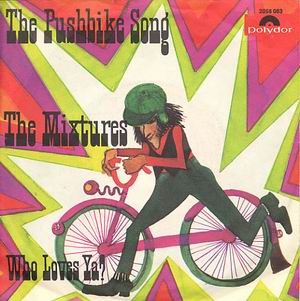
"The Pushbike Song" is a song originally recorded by Australian band The Mixtures and released in 1970. The single was a chart success, reaching numbers one and two in the Australian and UK charts respectively. It has subsequently been covered by various artists.

Prima Donna were the United Kingdom representatives in the Eurovision Song Contest 1980. The group comprised sisters Kate and Jane Robbins, Sally Ann Triplett, Danny Finn, Alan Coates and Lance Aston. Finn was a former member of The New Seekers and was married to fellow ex-New Seeker Eve Graham. Robbins later embarked on a successful career as a comedian, impressionist and actress.
The Springfields were a British folk-pop vocal trio who had success in the early 1960s in the UK, Australia, US and Ireland. They included singer Dusty Springfield and her brother, songwriter Tom Springfield, along with Tim Feild, who was later replaced by Mike Hurst.
The Mixtures were an Australian rock band that formed in Melbourne in 1965.
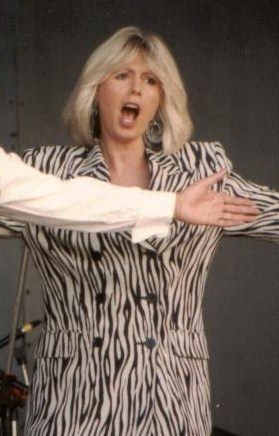
Sandra Stevens is an English singer and member of pop group Brotherhood of Man.

Paul Martin Layton is an English musician and former child actor. He is the bassist and vocalist of the group The New Seekers.
David Mackay is an Australian record producer, arranger and musical director. He began his music career at the age of 15 in a production of Bye Bye Birdie for J. C. Williamson Theatre Company. He also worked for a time recording musical sessions for local radio.
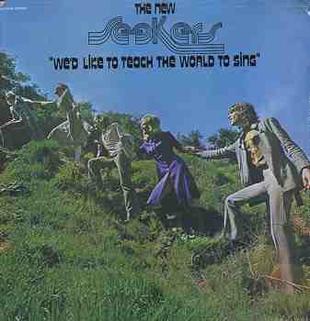
We'd Like to Teach the World to Sing is the name given to two albums by UK pop group The New Seekers. The first of these, released in late 1971, was a repackaging of their previous album New Colours and was released in the US. The second version of the album was released in the UK and Europe in 1972 with a new line-up of tracks. Both albums however contained the song "I'd Like to Teach the World to Sing ".

Beautiful People is a 1971 album by UK pop group The New Seekers. This was the group's third album and their last one released in the UK on the Philips record label. It was their first to be solely produced by David Mackay, who would guide the group through their most successful period over the next two years.
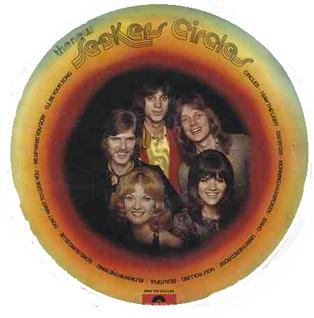
Circles is a 1972 album by UK pop group The New Seekers. It was the group's sixth album and released at the peak of their success. In the UK the album was notably released in a cut-out circular sleeve.
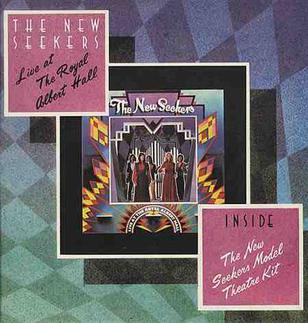
Live at the Royal Albert Hall is a 1972 double-album by British pop group The New Seekers. The album was released in November, having been recorded some months earlier.

Now is a 1973 album by British pop group the New Seekers. It was retitled Pinball Wizards in the US.

Farewell Album is the final album released by The New Seekers in their early 1970s hit-making line up, released in 1974. It is also the group's last release on Polydor Records.
References
- 1 2 1963, Lyn Paul's website
- 1 2 3 4 Donna Jones Biography
- 1 2 3 4 5 6 1963–1973, Donna Jones Biography, page 2 of 13, The New Seekers website, www.thenewseekers.com
- 1 2 Francine Rees Biography at Lyn Paul's website, www.lynpaulwebsite.org
- ↑ The Springfields states: "former stage musical actor Ray Hoskins, alias Ray Martin (vocals, guitar), from London".[ citation needed ]
- ↑ Duo with Mick Flinn, Donna Jones Biography, page 6 of 13, The New Seekers website, www.thenewseekers.com
- ↑ Pussyfoot 1980, Donna Jones Biography, page 7 of 13, The New Seekers website, www.thenewseekers.com
- ↑ Donna Jones Biography at Lyn Paul's website, www.lynpaulwebsite.org
- 1 2 Mick Flinn Biography at Lyn Paul's website, www.lynpaulwebsite.org
- 1 2 Mick Flinn's website, mickflinn.com
- ↑ "The Mixtures". MILESAGO: Australasian Music & Popular Culture 1964–1975. www.milesago.com. Retrieved 26 May 2014.
- ↑ "After The Mixtures ..." MILESAGO: Australasian Music & Popular Culture 1964–1975. www.milesago.com. Retrieved 26 May 2014.